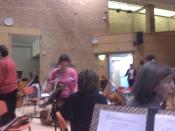Lebanon, located in the Middle East, is neighbored by Israel, Syria, and Jordan. It has a Mediterranean climate with transitional season changes. The summer months are extremely hot and humid with little rainfall. Temperatures along the coast typically reach well over 100 degrees Fahrenheit. The local populous numbers over four million people, and though there are a number of religions in the country, the three largest religious sects are ShiÃÂi and Sunni Muslims along with Maronite Christians [10, 11].
Arabic is the predominant language spoken in Lebanon, yet English, French, and Armenian is widely spoken. The currency exchange rate is 1,500 Lebanese pounds to one U.S. dollar. Major imports are mineral products and electronics while major exports include jewelry and chemical products. The infrastructure includes the Beirut International Airport and four sea ports with the port in Beirut serving as the main throughput for maritime operations [3]. The country is served by a network of over 7,000 miles of roadway.
There is 4,350 miles of primary and secondary roads, 3,853 miles of which are paved. Since 1991, the government has given much attention to rebuilding the infrastructure, yet the road system, especially within Beirut and in remote areas, remains in poor condition.[9]Cultural aspects to consider avoiding are alcohol and cigarettes, while flowers or candy are considered appropriate gifts. The culture is not particularly concerned with punctuality, since they consider it important to inquire about the hostÃÂs well being and his family. A topic considered inappropriate for discussion, until after the meal, is business while safe conversational topics may include Lebanese homes, food, achievements, business, children, education and travel. Forbidden topics are about politics, religion and sex [10, 11].
The Lebanese Government is structured on the TaÃÂif Accord under which Christians and Muslims share legislative power through a unicameral National Assembly.


